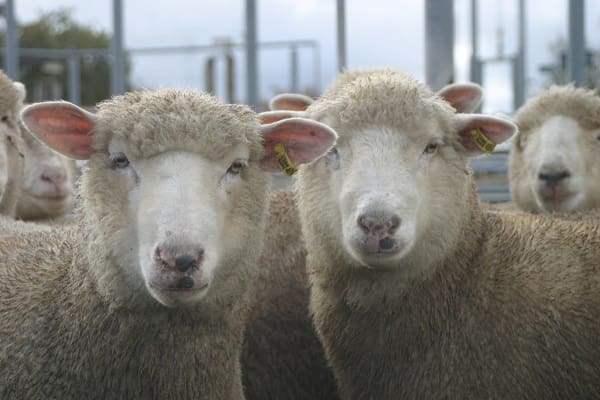
Lambs with electronic ear tags.
NSW Farmers is asking the sheep and wool industry’s peak bodies to not support draft National Livestock Identification System business rules and standards until Victoria agrees.
Draft NLIS standards that are supported by all states except Victoria are set to be considered by the SAFEMEAT Advisory Group next week before being referred to SAFEMEAT Partners.
All states except Victoria have supported draft NLIS business rules and standards, including a requirement for movement documentation for livestock going to agricultural shows and leg banding of goats.
However, in a stark contrast to New South Wales’ previous refusal to harmonise its EID timeline with other states, the state’s peak farmer body has warned it will walk away from the sheep and goat EID traceability reforms unless states and territories implement the same system with the same compliance requirements.
The NSW Farmers stance follows WoolProducers — supported by AgForce — pulling out of the national EID rollout process, citing inequitable cost sharing and lack of harmonisation.
NSW Farmers Sheepmeat Committee chairman Chris Kemp said WoolProducers Australia, Sheep Producers Australia and the Goat Industry Council of Australia are being urged to not endorse the draft NLIS business rules at SAFEMEAT until all states agree on them.
“Unless you’ve got the minimum standards the whole thing is not going to work, so we are not endorsing the (draft) NLIS standards until everyone is on board with them.”

NSW Farmers president Xavier Martin.
NSW Farmers president Xavier Martin said jurisdictional harmonisation of mandatory sheep and goat EID traceability was increasingly at risk as state and territories moved in a different direction, undermining the fundamental biosecurity goals of the system.
“This is a critical issue for sheep and goat producers, one we have spent a considerable amount of time working on, and now we may have no choice but to walk away.
“Our in-principle support for the mandated development of a national individual traceability system has always been contingent on several principles, including the system having jurisdictional harmonisation – this must be delivered consistently across all states and territories,” Mr Martin said.
“This is supposed to be about improving Australia’s biosecurity systems, but unless there is jurisdictional harmonisation and consistent compliance we cannot support the adoption of the NLIS Standards for Sheep and Goats.”
NSW Farmers said the spectre of a potential Foot and Mouth Disease outbreak loomed large when the mandate for a national sheep and goat EID rollout was announced by former Agriculture Minister Dugald Saunders in 2022. But while some arrangements were made to facilitate the system – due to roll out for farmers from 1 January 2025 – each state and territory jurisdiction was working independently rather than together, the state farming body said.
NSW set a timeline for all farmed sheep and goats leaving a property to require an EID device from 1 January 2027 — subsequently followed by South Australia, Queensland and the Australian Capital Territory — rather than the 2025 date agreed by AGMIN, whereas Western Australia has settled on 1 July 2026, and the Northern Territory and Tasmania are targetting 1 January 2025.
“The clue is in the title – this is supposed to be a national scheme – but there is a real risk with each state and territory moving in its own direction,” Mr Martin said.
“Our members face the prospect of being left with a system that is not fit for purpose, and the notion that this piecemeal approach will deliver some national benefit is laughable.
“We have worked consistent with our principles in good faith, but if the states and territories can’t agree then how can they ever expect farmers to support this system?”
NSW Farmers policy on NLIS for Sheep and Goats stipulates that the national system must:
- a) Have jurisdictional harmonisation
- b) Reduce tag costs to an economically affordable level (ie. national tag tender)
- c) Financially assist farmers and the supply chain to invest in technology
- d) Be underpinned by an equitable funding arrangement across the supply chain
- e) Ensure NLIS database has proven capability
- f) Retain the option of tag free pathways
- g) A staged roll out over a five-year period
- h) Be developed in consultation with producers; and
- i) NLIS is the only system that is available for stock movements



HAVE YOUR SAY